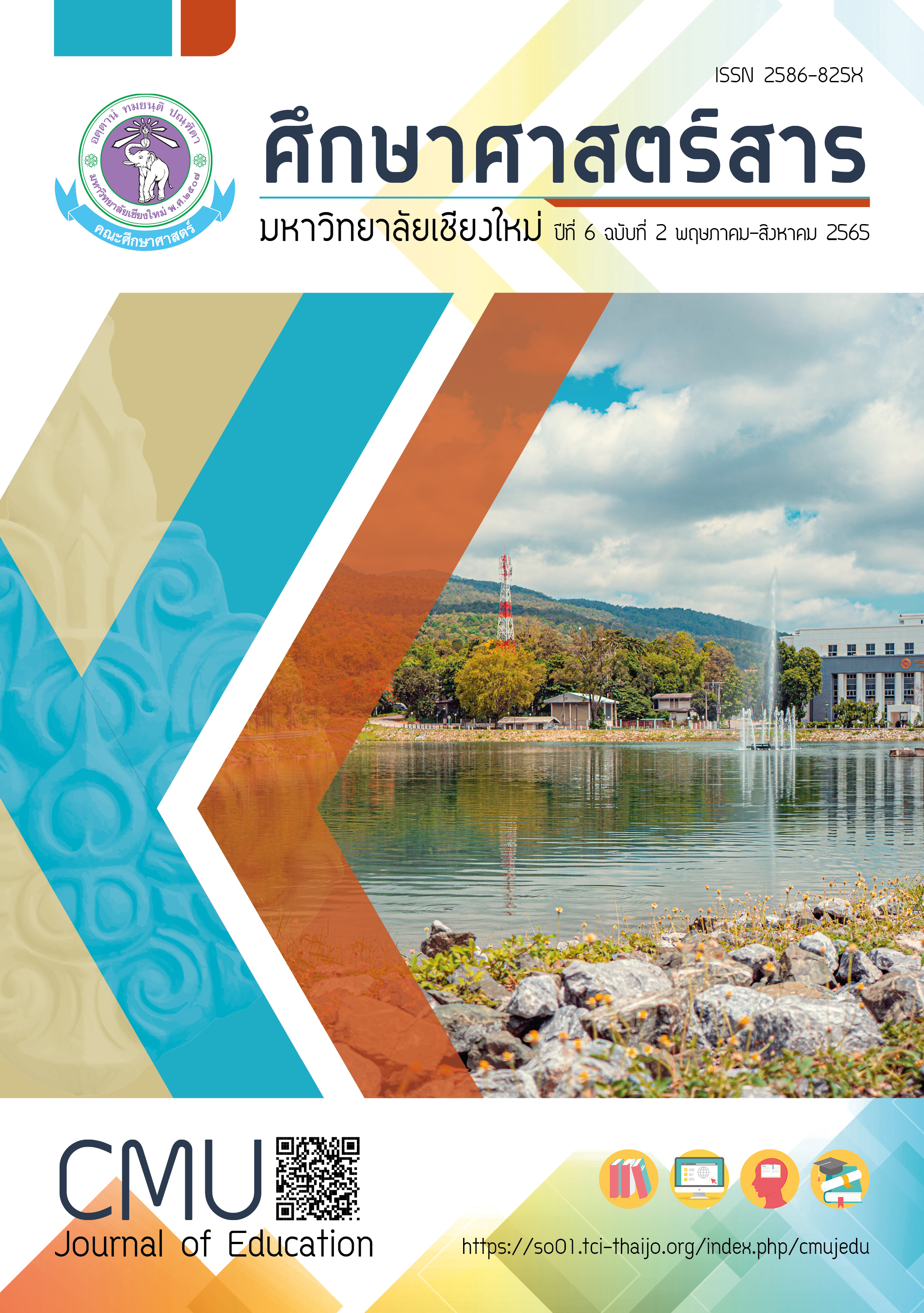ความสัมพันธ์ระหว่างปัจจัยพื้นฐานในการพัฒนาทรัพยากรมนุษย์ กับความยึดมั่นผูกพันต่อวิชาชีพครูของนักศึกษาหลักสูตรครุศาสตรบัณฑิต สาขาวิชาดนตรีศึกษา คณะครุศาสตร์ มหาวิทยาลัยราชภัฏเชียงใหม่
Main Article Content
บทคัดย่อ
การวิจัยนี้มีวัตถุประสงค์เพื่อ 1) พัฒนาแบบวัดความยึดมั่นผูกพันที่มีต่อวิชาชีพครูของนักศึกษาหลักสูตรครุศาสตรบัณฑิต สาขาวิชาดนตรีศึกษา 2) ศึกษาระดับความยึดมั่นผูกพันและความสัมพันธ์ระหว่างปัจจัยพื้นฐานในการพัฒนาทรัพยากรมนุษย์กับความยึดมั่นผูกพันที่มีต่อวิชาชีพครูของนักศึกษาหลักสูตรครุศาสตรบัณฑิต สาขาวิชาดนตรีศึกษา 3) จัดทำข้อเสนอแนะในการพัฒนาหลักสูตรครุศาสตรบัณฑิต สาขาวิชาดนตรีศึกษา ซึ่งทำการศึกษากับกลุ่มตัวอย่างนักศึกษาชั้นปีที่ 1 ถึงชั้นปีที่ 5 สาขาวิชาดนตรีศึกษา คณะครุศาสตร์ มหาวิทยาลัยราชภัฏเชียงใหม่ ในปีการศึกษา 2563 จำนวน 179 คน โดยวิธีการสุ่มแบบหลายขั้นตอน ผลการวิจัยพบว่า 1) แบบวัดความยึดมั่นผูกพันต่อวิชาชีพครูมีความตรงเชิงเนื้อหา อำนาจจำแนกและความเที่ยงเป็นไปตามเกณฑ์ที่ยอมรับได้ รวมทั้งมีความตรงเชิงโครงสร้าง 2) นักศึกษาโดยรวมมีความยึดมั่นผูกพันต่อวิชาชีพครูในระดับมาก ปัจจัยพื้นฐานในการพัฒนาทรัพยากรมนุษย์มีความสัมพันธ์กับความยึดมั่นผูกพันต่อวิชาชีพครูในระดับต่ำมากถึงปานกลาง อย่างมีนัยสำคัญทางสถิติที่ระดับ .01 และ .05 3) ข้อเสนอแนะในการพัฒนาหลักสูตร ประกอบด้วย (1) การกำหนดคุณสมบัตินักศึกษาเพื่อการเข้าศึกษาในหลักสูตร (2) อัตลักษณ์ ค่านิยม คุณลักษณะเฉพาะของนักศึกษา (3) กิจกรรมเสริมหลักสูตร และ (4) แผนการพัฒนาคุณภาพชีวิตของนักศึกษาและสิ่งอำนวยความสะดวกในการเรียน
Article Details

อนุญาตภายใต้เงื่อนไข Creative Commons Attribution-NonCommercial-NoDerivatives 4.0 International License.
หากผู้เสนอบทความมีความจำเป็นเร่งด่วนในการตีพิมพ์โปรดส่งลงตีพิมพ์ในวารสารฉบับอื่นแทน โดยกองบรรณาธิการจะไม่รับบทความหากผู้เสนอบทความไม่ปฏิบัติตามเงื่อนไขและขั้นตอนที่กำหนดอย่างเคร่งครัด ข้อมูลของเนื้อหาในบทความถือเป็นลิขสิทธิ์ของ Journal of Inclusive and Innovative Education คณะศึกษาศาสตร์ มหาวิทยาลัยเชียงใหม่
เอกสารอ้างอิง
Aiken, L., R. (1991). Psychological Testing and Assessment. (7th edition). Boston: Allyn and Bacon.
Chandra, H., M. (2020). Examining Students’ and Teachers’ Perceptions of Differentiated Practices, Student Engagement, and Teacher Qualities. Journal of Advanced Academics, 31(4), 530–568.
Chumwijarn, S., Wongwanich, S. & Piromsombat, C. (2016). Development and Validatin of The Research Engagement Measurement Instrument for Doctoral Student in the Faculty of Education : Maximum Likelihood and Bayesian Approaches. Suandusit Research Journal, 12(2), 83-107. (In Thai)
Dangsanit, W. (2014). A Causal Relationship Between Positive Psychological capital and Job Satisfaction with Work Engagement as Mediator. An Online Journal of Education, 9(2), 307-319.
Debora, L., Roorda, S., J., Marjolein Z., Frans J., O. & Helma, M., Y., Koomen | Erin Dowdy. (2017). Affective Teacher–Student Relationships and Students' Engagement and Achievement : A Meta - Analytic Update and Test of the Mediating Role of Engagement, School. Psychology Review, 46(3), 239-261.
Durksen, T.L., Way, J., Bobis, J. et al. (2017). Motivation and engagement in mathematics : a qualitative framework for teacher-student interactions. Math Education and Research Journal, 29(2), 163–181.
Hair, J. S. (2010). A primer on partial least squares structural equation modeling : (PLS-SEM). USA: Sage publications.
Hulley, S., B., Cummings, S., R., Browner, W., S, Grady, D., & Newman, T., B. (2013). Designing clinical research : An epidemiologic approach. (4th ed.). Philadelphia: Lippincott Williams &.
Kanjanawasee, S. (2009). Classical Test Theory. (5th edition). Bangkok: Chulalongkorn University Publishing. (In Thai)
Kanjanawasee, S. (2013). Principal of test theory. Bangkok: Chulalongkorn University Publishing. (In Thai)
Kerlinger,F., N. (1986). Foundations of Behavioral Research. (3rd edition). USA.: Winston Inc.
Kline, P. (1986). The handbook of psychological testing. NY. USA.: Psychology Press.
Kojaranjit, P., Detkasem, N., Kawethanasin, K. & Chalpakdee, N. (2017). Relationships between Personal Factors Efficacy Human Resource Management of Nursing Department and Organizational of Professional Nurses at Queen Sirikit National Institute. Journal of The Department of Medical, 42(2), 40-48 .
Locasale, C., J., Jamil, F., Pianta, R. C., Rudasill, K. M., & DeCoster, J. (2018). Observed Quality and Consistency of Fifth Graders’ Teacher–Student Interactions : Associations With Feelings, Engagement, and Performance in School. SAGE Open, 2(2), 765-790.
Ministry of Higher Education Science Research and Innovation. (2020). Higher Education Development plan. Bangkok: Karusapalardprow Publishing. (In Thai)
OECD. (2018). Student engagement at school sense of belonging and participation results from PISA 2015. Paris: OECD.
Oonnang, K. (2021). Effects of Using Active Learning Management on Learning Achievement, Learning Management Skill and Attitude towards Teaching Profession. CMU. J. Ed., 5(2), 15-24. (In Thai)
Phonpunthin, Y. (2016). The Effect of Empowering Leadership Behavior Self-Efficacy Work Engagement Job Satisfaction on Teacher’s Job Performance. Veridian E-journal Silpakoorn University, 9(1), 311-322. (In Thai)
Phuhongthong, C. (2017). Relationship Between Psychological Capital and Professional Engagement in Pre-service Student Teachers. Journal of Education Khon-Kaen University, 40(1), 49-59. (In Thai)
Pitupumnak, K. (2020). State of Music Disciplines in Higher Educational Institutions in Northern Thailand. CMU. J. Ed., 4(3), 106-119. (In Thai)
Rosseel, Y. (2012). Lavaan: An R Package for Structural Equation Modeling. Journal of Statistical Software, 48(2), 1-36.
Soper, D. S. (2020). A-priori Sample Size Calculator for Structural Equation Models. [Software]. Retrieved from https://www.danielsoper.com/statcalc.
Srisaard, B. (1997). Principal of Easement in Education. (5th edition). Bangkok: Suriwisan. (In thai)
Srisuan, H. (2014). A Casual Relationship Between The Quality of Professional Teaching Practices and Work Engagement of Pre-Service Teaching with Self-Efficacy as Mediator. An Online Journal of Education, 9(2), 335-349. (In Thai)
Sukmak, P., Yongsorn, J., & Thanosawan, P. (2017). A Explorator Factor Analysis of Engagement in Teaching Profession for Industrial Student of King Mongkut’s Technology Institution Group. Journal of Industrial education, 11(1), 33-47. (In Thai)
Tayraukham, S. (2016). The Development of Psychometric scale in Education. Journal of research for Development Social and Community, 3(5), 35-48. (In Thai)
Tuntasawat, W., Supalearkchaisakul, N. & Jongwisan, R. (2016). Factors Affecting Professional learning Activity and Work Engagement Through Spiritual Well-being of Secondary School Teaching in The Learning Area in Bangkok. Journal of Graduate Studies Valaya Alongkorn Rajabhat University, 10(1), 179-192. (In Thai)
UNDP. (2019). Human Development Report 2019. NY USA: UN Plaza.
Wongkhumsin, T. (2018). Positive Psychological Capital Psychological Well-Being and Professional Engagement of Government Teachers Under The Bangkok Metropolitan Administration School. Journal of Social Science and Humanity, 44(2), 211-248. (In Thai)


